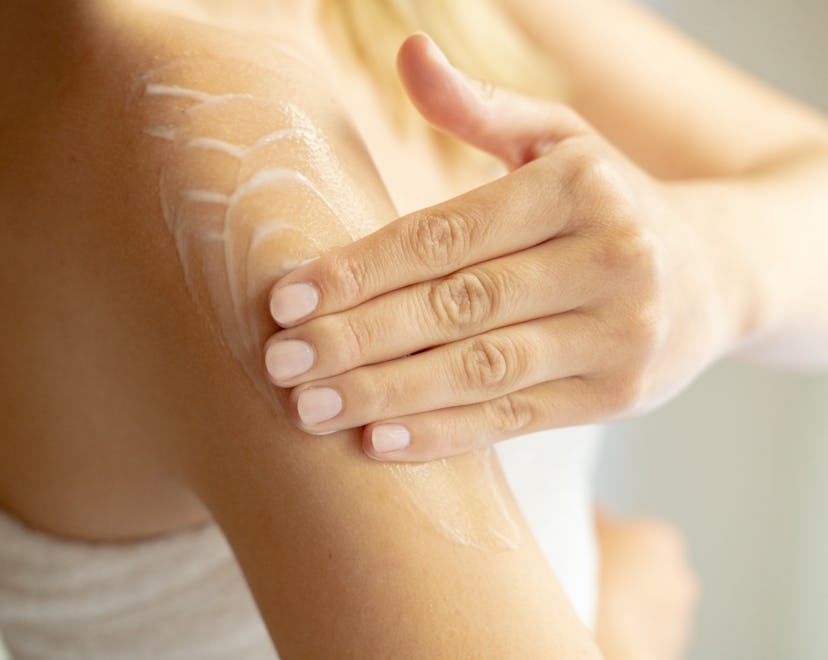Postpartum

Here's Why Postpartum Dry Skin Happens & What You Can Do
The last thing you need to deal with right now is itchy skin.
With so much to focus on after giving birth, it makes sense that you may not be totally in tune with how your skin feels. But if in between feedings, wake-ups, loads of laundry, and doing your best to care for a helpless being, you notice that your skin feels dry and scaly after giving birth, you’re not alone. Postpartum dry skin is common (and it can be a carryover of dry, itchy pregnant skin).
Romper spoke to two dermatologists about what causes skin changes after giving birth and how you can make scaly skin more manageable while you wait for your hormones (and therefore, your skin) to level out.
What causes postpartum dry skin?
Everything from the baby blues, to achy joints and postpartum hair loss are caused by hormonal fluctuations, so it makes sense that your skin would also experience some changes after giving birth. “The dramatic decline in estrogen and progesterone after giving birth can contribute to dry skin,” Dr. Hadley King, NYC-based board-certified dermatologist, tells Romper. If you’re nursing, your body also uses a lot of water while breastfeeding, and dehydration can also dry out skin.
The potentially good thing is that “not everyone will get [dry skin postpartum] but it’s always a good idea to moisturize anyway during pregnancy,” Dr. Marina Peredo, NY-based board-certified dermatologist, tells Romper.
How to treat postpartum dry skin
As you probably expected, the best way to treat postpartum dry skin is to use a moisturizer, though not all moisturizers are not created equal. “Moisturizers need to contain three components: humectants, emollients, and occlusives. It's important to look for products that contain all three,” Dr. King tells Romper.
Humectants, like honey, hyaluronic acid, and glycerin, pull moisture in from the air, but they need moisture to be present to work, so it’s best to use humectants on damp skin. “The best time to moisturize is right after you get out of the shower to lock in the moisture,” Dr. Peredo says.
Emollients help with skin barrier function, Dr. King explains, and can lead to overall improvement in skin texture and appearance. Examples of emollients include squalene and ceramides.
And finally, occlusives are oils and waxes which form a layer on the skin and “physically block transepidermal water loss,” Dr. King tells Romper. Look for products containing beeswax, certain oils, silicones, lanolin or zinc oxide, which are all occlusive ingredients. You’ll also want to avoid moisturizers with added fragrance, which can be irritating.
Any moisturizer you already have and like should help ease your dry skin, plus it’ll save you a trip to the store. However, if your normal moisturizer doesn’t seem to be helping, “you can use an oil-based moisturizer, heavier creams or ointments to combat dry skin,” Dr. Peredo says. Dr. King specifically suggests Schaf Moisturizer which “locks in moisture with hyaluronic acid and a blend of hemp seed, avocado, grape seed and pumpkin seed oils.” Another one of her faves? Simple's Kind to Skin Replenishing Rich Moisturizer, which is hypoallergenic and non-comedogenic (plus it’s available at Target and other drugstores).
Dr. Peredo recommends a staple product you probably use on your baby’s dry skin: Aquaphor. In addition to hydrating dry skin on the face, she says it works well on the breast.
When you have dry skin, don’t forget to look at your body soap and your cleansers. “Cleansers should be gentle soap substitutes that are free of harsh detergents that will strip the natural oils from the skin, and that contain moisturizing ingredients,” Dr. King tells Romper. She specifically recommends Dove products for the body, and NakedPoppy's Nourish Cream Cleanser as a gentle option for the face.
You probably gave up your retinoids and products containing salicylic acid during pregnancy, and Dr. Peredo says it’s best to skip those ingredients while you’re breastfeeding too. First off, they can be drying, and secondly, “even though there is no strong study against breast milk being influenced because of retinol, it’s still best to avoid,” she adds.
Lifestyle changes to help with postpartum dry skin
You can also make some lifestyle tweaks to help with your dry skin. In addition to moisturizing and drinking plenty of water, try to keep your showers brief (Dr. King says seven minutes max, once per day), and lukewarm if you can stand it, as hot water can be drying. Eating healthy fats helps support the skin barrier, Dr. King adds, and if you live in a dry climate, try putting a humidifier in your bedroom.
How long does postpartum dry skin last?
When your skin is dry, itchy, or red, it’s easy to feel like it’s going to be that way forever, just like when you have a newborn you kind of think you may be tired forever. The good news is that postpartum dry skin should resolve as your hormones level out (though sadly I can’t say the same for fatigue). “When periods return it's a sign that the hormones have returned to their pre-pregnancy levels and skin should also return to its pre-pregnancy state,” Dr. King says. So maybe you’ll actually be psyched to see your period if it means some relief for your skin.
Experts:
Dr. Hadley King, NYC-based board-certified dermatologist
Dr. Marina Peredo, NY-based board-certified dermatologist